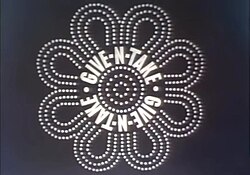This is an old revision of this page, as edited by 24.186.204.83 (talk) at 03:13, 13 June 2011. The present address (URL) is a permanent link to this revision, which may differ significantly from the current revision.
Revision as of 03:13, 13 June 2011 by 24.186.204.83 (talk)(diff) ← Previous revision | Latest revision (diff) | Newer revision → (diff)| This article does not cite any sources. Please help improve this article by adding citations to reliable sources. Unsourced material may be challenged and removed. Find sources: "Give-n-Take" – news · newspapers · books · scholar · JSTOR (May 2011) (Learn how and when to remove this message) |
| Give-n-Take | |
|---|---|
 Give-n-Take title logo. Give-n-Take title logo. | |
| Created by | Carruthers Co. Productions |
| Directed by | Bill Carruthers |
| Presented by | Jim Lange |
| Narrated by | Johnny Jacobs |
| Country of origin | |
| No. of episodes | 60 |
| Production | |
| Production locations | The Burbank Studios Burbank, California |
| Running time | 30 Minutes |
| Original release | |
| Network | CBS |
| Release | September 8 – November 28, 1975 |
Give-n-Take is an American television game show which ran on CBS from September 8 to November 28, 1975. Jim Lange hosted, with Johnny Jacobs announcing. The series, which replaced Spin-Off (also hosted by Lange and announced by Jacobs), ended after 60 episodes.
Gameplay
Four female contestants competed to accumulate prizes with a total value as close to $5,000 without going over. The returning champion and three challengers each sat in one portion of an eight-spaced board, shaped like a daisy. Each contestant's bank was staked with a prize and the dollar value revealed to all contestants.
A prize was described (but not its value) and Lange asked a question. The contestant who buzzed in and gave the correct answer took control of the four neutral "advantage spaces" on the board, in addition to their own, giving them a total of five spaces. The other three contestants controlled the spaces in which they sat. The contestant who answered the question correctly stopped a large spinning arrow in the middle of the board. The contestant on whose space the arrow stopped won control of the prize, and that chose one of the following actions:
- Keep the prize, in addition to whatever prizes she had already banked.
- Keep the prize and pass any other prize(s) she had banked to an opponent.
- Pass the prize, keeping all other prizes banked.
- Pass the prize and any other prize(s) banked.
After a prize was assigned, a bell or buzzer was heard indicating whether or not that contestant's bank value was below $5,000. The actual value of the bank was never revealed, only whether or not they were below the $5,000 target. Play then repeated in the same manner, with a new prize described.
A contestant could freeze at any point if she thought she was close to the $5,000 limit, preventing her from receiving any other prizes passed to her from her opponents. If a contestant's bank value was over $5,000, that player was "frozen" and unable to accept any other prizes passed to them by their opponents. The player was then required to answer questions in the manner described above to pass some of their prizes and reduce the value of their bank.
If the arrow landed on a frozen player, the prize in play would automatically be added to the bonus round. The player whose bank was closest to $5,000 without going over won all the prizes in their bank and advanced to the bonus round. The other players left with parting gifts.
Bonus round
The champion selected one of the eight spaces on the board and stopped the arrow from spinning. If the arrow landed on the space selected, the contestant won all prizes described that day in addition to what they had already won.
Champions stayed on the show for a maximum of five days, or until they reached CBS' $25,000 winnings limit.
Broadcast history
Give-n-Take debuted on September 8, 1975 at 10:00 AM Eastern (9:00 Central), replacing the Nicholson-Muir Production Spin-Off. On November 3, Give-n-Take was moved to 4:00 PM (3:00 Central). On December 1, Give-n-Take was replaced by Tattletales.
See also
- Say When!! (a 1960s game show similar to Give-n-Take)